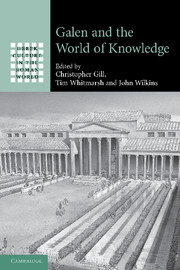Book contents
- Frontmatter
- Contents
- Notes on contributors
- Note on conventions
- Preface
- Introduction
- 1 Galen's library
- 2 Conventions of prefatory self-presentation in Galen's On the Order of My Own Books
- 3 Demiurge and Emperor in Galen's world of knowledge
- 4 Shock and awe: the performance dimension of Galen's anatomy demonstrations
- 5 Galen's un-Hippocratic case-histories
- 6 Staging the past, staging oneself: Galen on Hellenistic exegetical traditions
- 7 Galen and Hippocratic medicine: language and practice
- 8 Galen's Bios and Methodos: from ways of life to path of knowledge
- 9 Does Galen have a medical programme for intellectuals and the faculties of the intellect?
- 10 Galen on the limitations of knowledge
- 11 Galen and Middle Platonism
- 12 ‘Aristotle! What a thing for you to say!’ Galen's engagement with Aristotle and Aristotelians
- 13 Galen and the Stoics, or: the art of not naming
- Bibliography
- Index
10 - Galen on the limitations of knowledge
Published online by Cambridge University Press: 06 August 2010
- Frontmatter
- Contents
- Notes on contributors
- Note on conventions
- Preface
- Introduction
- 1 Galen's library
- 2 Conventions of prefatory self-presentation in Galen's On the Order of My Own Books
- 3 Demiurge and Emperor in Galen's world of knowledge
- 4 Shock and awe: the performance dimension of Galen's anatomy demonstrations
- 5 Galen's un-Hippocratic case-histories
- 6 Staging the past, staging oneself: Galen on Hellenistic exegetical traditions
- 7 Galen and Hippocratic medicine: language and practice
- 8 Galen's Bios and Methodos: from ways of life to path of knowledge
- 9 Does Galen have a medical programme for intellectuals and the faculties of the intellect?
- 10 Galen on the limitations of knowledge
- 11 Galen and Middle Platonism
- 12 ‘Aristotle! What a thing for you to say!’ Galen's engagement with Aristotle and Aristotelians
- 13 Galen and the Stoics, or: the art of not naming
- Bibliography
- Index
Summary
INTRODUCTION
Galen was no sceptic. On several occasions he refers derisively to ‘boorish Pyrrhonists’, suggesting that scepticism, at least in its more extreme forms, is a matter of a lack of culture, an intellectual infantile disorder. Time and again, he stresses that, if only the inquirer is blessed with diligence, honesty and intelligence, and armed with the proper logical tools of rational discourse, he can aspire to a genuine understanding of the way in which the physical (or more particularly the physiological) world works. In Elements According to Hippocrates (Hipp.Elem.), he argues that the successful medical practitioner needs to know the fundamental elements that make up physical objects, and how they interrelate to one another (although as we shall see, there are some qualifications to this necessity); he affirms that it is demonstrable that monism is false; and even more strikingly affirms that Hippocrates himself (in Nature of Man) demonstrated its falsity (Hipp.Elem. I.415–16; cf. 416–42). In a similar vein, On Mixtures (Temp.) talks of the importance of understanding the real states of affairs in regard to the internal mixtures of the body and its various properties, phenomenal and causal, and of properly assessing the varying degrees of heat, cold, dryness and moisture of the various parts. Another ‘physical’ treatise, On the Natural Faculties (Nat.Fac.), argues for the reality of certain fundamental natural capacities (attraction, retention, alteration and expulsion) possessed by distinct parts of animals' bodies in virtue of which they can perform their functions, and against what he stigmatises as the excessively crude materialism of the atomists and their various anti-teleological acolytes.
- Type
- Chapter
- Information
- Galen and the World of Knowledge , pp. 206 - 242Publisher: Cambridge University PressPrint publication year: 2009
- 7
- Cited by

